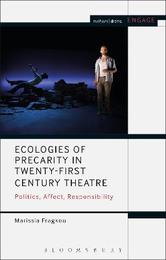
|
Ecologies of Precarity in Twenty-First Century Theatre: Politics, Affect, Responsibility
Paperback / softback
Main Details
| Title |
Ecologies of Precarity in Twenty-First Century Theatre: Politics, Affect, Responsibility
|
| Authors and Contributors |
By (author) Dr Marissia Fragkou
|
| Series | Methuen Drama Engage |
|---|
| Physical Properties |
| Format:Paperback / softback | | Pages:248 | | Dimensions(mm): Height 216,Width 138 |
|
| ISBN/Barcode |
9781350154858
|
| Classifications | Dewey:792.013 |
|---|
| Audience | | Tertiary Education (US: College) | |
|---|
|
Publishing Details |
| Publisher |
Bloomsbury Publishing PLC
|
| Imprint |
Methuen Drama
|
| Publication Date |
19 March 2020 |
| Publication Country |
United Kingdom
|
Description
Presenting a rigorous critical investigation of the reinvigoration of the political in contemporary British theatre, Ecologies of Precarity in Twenty-First Century Theatre provides a fresh understanding of how theatre has engaged with precarity, affect, risk, intimacy, care and relationality in recent times. The study makes a compelling case for reading precarity as a 'sticky' theatrical trope which carries the potential to re-animate our understanding of identity politics and responsibility for the lives of Others in an age of uncertainty. Approaching precarity as an ecology cutting across various practices, themes and aesthetics, the book features a comprehensive selection of theatre examples staged in the UK since the 1990s. Works by debbie tucker green, Alistair McDowall, Complicite, Simon Stephens, Stan's Cafe, Mike Bartlett, Caryl Churchill, The Paper Birds, and Belarus Free Theatre are put in dialogue with interdisciplinary feminist vocabularies developed by Judith Butler, Sara Ahmed, Lauren Berlant and Isabell Lorey. In focusing on areas such as children and youth at risk, human rights, environmental ethics and the politics of debt, the study makes a vital contribution to the burgeoning field of politics and theatre in the 21st century.
Author Biography
Marissia Fragkou is Senior Lecturer in Performing Arts at Canterbury Christ Church University, UK. Her research focuses on the politics of representation, feminist theatre, affect, ethics, and precarity. She has published on British and European theatre for Palgrave, Bloomsbury Methuen, Performing Ethos, Contemporary Theatre Review and Modern Drama and has co-edited a special issue on contemporary Greek theatre for The Journal of Greek Media and Culture (2017).
ReviewsRigorously researched and grounded in an impressive range of examples, Ecologies of Precarity in Twenty- First Century Theatre presents precarity has a central preoccupation of contemporary British theatre makers and playwrights, while exposing the complicities of Britain in producing and sustaining the conditions that ensure its continued proliferation. This timely and important work addresses the spread of precarity in the wake of significant economic and geopolitical traumas of the past thirty years, and considers how playwrights and theatre makers in Britain have been responding by exploring dystopia, the apocalyptic, the young, social justice, dispossession, and the unequal distribution of grievability. In the light of unprecedented numbers of refugees fleeing war-torn countries, the post-2008 economic meltdown and debt crises, and the 'slow violence' of the climate emergency - to name a few examples of the 'social ecology of precarity' addressed in the book - one wonders what relevance theatre really has as a forum for exploring and responding to events of such magnitude. What makes Marissia Fragkou's book so instructive is its assessment of the capacities for theatre to recalibrate regimes of visibility and invisibility in the same breath as considerations of the 'cruelty' of transformative ambition, and the complicities of theatre in reflecting the very frameworks and policies that weave 'crisis' into the social fabric. This is really a study of precarities, with relationships between precarity, representation, indebtedness and inequitable levels of vulnerability sitting at its heart. It is also a work that moves well beyond fatalism in acknowledging spaces for salvaging and being moved by vivid encounters with anger and care, discord and empathy, while foregrounding the importance - urgency, even - of reappraising what might be meant by responsibility, interdependence, solidarity and hope in the twenty-first century. * Dr. Adam Alston, Senior Lecturer in Modern and Contemporary Theatre, Goldsmiths, UK *
|